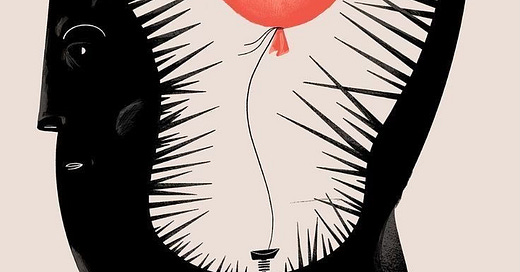No one is born to make you happy. The moment you think so, you’re stuck. You’d constantly feel punished by everyone around you. And obviously, you’d want to punish everyone in return. That’s how resentment works: it’s a boomerang. You throw it out at the world, and it smacks you in the face. You’d think happiness is your birthright, like air or Wi-Fi, but no one promised you that. And if they did, they lied, probably with good intentions, but still lied. Happiness isn’t delivered; it’s assembled. And there’s no instruction manual.
The problem begins when you outsource your happiness, like hiring an unreliable contractor to build a house. You’re left with half-done walls, no roof, and a vague sense that someone owes you an apology. But here’s the bitter truth: no one does. People are busy patching up their own roofs or pretending they don’t need one. Expecting them to show up with a toolkit for your joy is as useful as waiting for rain in a desert.
It’s not entirely your fault, though. You’ve been trained for this. Fairy tales sold you the idea of princes and soulmates who’d arrive with glittering solutions to all your emotional problems. Nobody told you that princes snore, soulmates argue about thermostat settings, and glitter is hell to clean up. They definitely didn’t tell you that all of it — love, connection, happiness — is messy, and the sooner you stop romanticising it, the sooner you can actually enjoy it.
Here’s the thing about happiness: it’s slippery. Chase it too hard, and it escapes like a bar of soap in the shower. Hold it too tight, and it dissolves. Ironically, it shows up when you stop treating it like a prize to be won and start treating it like a mood to be cultivated. A warm cup of tea, a good book, or even the simple thrill of socks fresh out of the dryer can offer more joy than a thousand likes on your curated Instagram post. But, of course, we’re trained to overlook these small moments because they’re not big enough.
You are your own worst critic, though. That little voice in your head — the one that says you’re only allowed to be happy if you achieve something, look a certain way, or get someone’s approval — is the first thing you need to silence. Or at least negotiate with. Happiness isn’t a reward; it’s an experiment. You try a little kindness here, a bit of gratitude there, and suddenly, you’ve hacked the system. It’s imperfect and fleeting, but it’s yours.
This isn’t to say that other people can’t make you happy — they can. But not in the way you think. People can add to your happiness, like seasoning on a dish you’ve already cooked. If you’re expecting them to serve you a gourmet meal while you sit idly by, you’re bound to be disappointed. Besides, their seasoning might not even match your taste. You’re the chef of this operation. Accept that, and suddenly, life tastes a whole lot better.
Ironically, the less you depend on others for happiness, the more they want to be around you. Misery loves company, but joy is contagious. When you’re not clutching at people to fill your voids, they find you refreshing, like a breath of air in a suffocating room. Happiness born from independence isn’t just attractive — it’s magnetic. And here’s the kicker: it’s also more sustainable.
But let’s not romanticise independence too much. You don’t need to be a lone wolf, howling at the moon in defiance of human connection. You just need to balance the scales. When you find happiness within, relationships become partnerships, not transactions. You stop treating people like ATMs for your emotional withdrawals and start appreciating them for who they are — flawed, messy, and beautifully human.
In the end, happiness is a choice, not a destination. It’s a messy, complicated, sometimes absurd choice, but a choice nonetheless. The moment you stop waiting for someone else to bring it to you and decide to cultivate it yourself is the moment you’re free. Free to stumble, to laugh, to cry, and to live without the exhausting weight of expectation. And isn’t that, in itself, a kind of happiness?





So much truth in every sentence! I 🤎 this!
I have always thought that Happiness is not something that come from outside. ( and, the verb “come” is used in a conditional tense).
Yet, we are addicted to the condition of being “happy” because the society has inoculated this idea like a Chinese drop until we find ourselves in the situation of being drugged and left in this terrible condition of a fake happiness. We have to admit that our present is so materialistic-oriented and it is so difficult to overpass it. We attend all kind of masterclasses of personal development, of coaching in order to find it, to listen to their needs actually, not ours. And we, finally, discover that - as you said - “ Happiness is not delivered; it is assembled…. Happiness is not a reward; it’s an experiment…. It’s a mood that must be cultivated” from inside and not wait to be taught or given by somebody else….